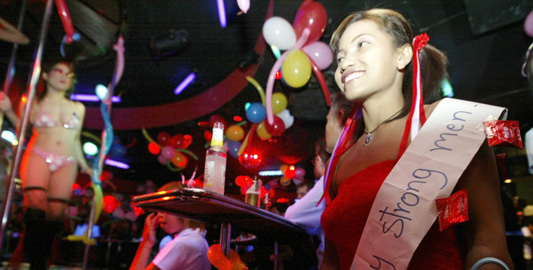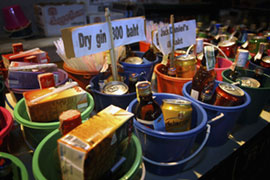Bangkok’s battle of ethics
Official concern over Thailand’s morals prompts heated debate on social issues.

Published On 10 Jul 2008
 |
| A Thai sex worker who is a delegate at the 15th International AIDS conference, wears a sash hung with condoms reading “I want many strong men” [EPA] |
Images of young women in short skirts engaged in ‘cat fights’ in a Thai TV drama have recently prompted a public outcry over Thailand’s sense of morality.
In January, Air Hostess War, a TV soap featuring air stewardesses fighting for the affections of a handsome but married pilot, caused a stir.
The show was considered too racy by some and prompted a complaint from the Thai Airways International labour union, accusing the producers of misrepresenting the profession.
“It’s all about sex and air hostesses beating each other up in the cabin because of love and jealousy,” Noppadol Thaungthong, a labour union official, was quoted as saying.
“This kind of thing never happens,” the union wrote to the culture ministry, demanding that “this ugly soap opera” be taken off the air.
The show’s broadcaster, Channel 5, was apologetic.
The show remained on air, but producers promised to tone down the story lines, keep any future brawls out of the aircraft cabin and lengthen the skirts of the air hostesses.
‘Steeped in hypocrisy’
|
“The hypocrisy comes from what the people in power pretend should be the right values, but those don’t coincide with the reality of the situation” Jon Ungphakorn, |
But the debate over what is acceptable has wider social implications than just concerns over a saucy TV show.
While the country’s moral guardians have been increasingly up in arms so too have those who believe the complaints of immorality are just hypocritical posturing that prevents Thailand from tackling important social change.
Jon Ungphakorn, a former senator for Bangkok, has described Thai society as “steeped in hypocrisy”.
“The hypocrisy comes from what the people in power pretend should be the right values, but those don’t coincide with the reality of the situation,” he told Al Jazeera.
“I think there is a sort of illusion among the authorities that we need to uphold a strong moral standard that is divorced from the reality on the ground.”
In February last year, Chotiros (Amy) Suriyawong, a Thai actress, was criticised after she appeared at an award ceremony wearing a publicity-grabbing dress and – allegedly – no underwear.
To be fair, not everyone hated the paparazzi-friendly dress, and comparable evening-wear at awards ceremonies in the West have elicited similar excitement.
But Chotiros, a student at Thailand’s Thammasat University, was ordered by university deans to issue a public apology and carry out community service – such as reading books to blind children.
She even lost film roles as a result.
Social issues
Thailand’s moral concerns may surprise foreign tourists, many of whom more closely associate Bangkok with partying and “ping-pong shows” – an unwelcome association for many Thais – than with Buddhism and the great Chulalongkorn, who ruled then Siam from 1868 to 1923.
 |
| For many tourists, travelling to Thailand is about the party scene [GALLO/GETTY] |
Every country deals to a greater or lesser extent with tensions between the scrupulously conservative and the morally liberal.
In Thailand’s case those tensions have had social consequences – a result Jon says is an unrealistic approach to the problems facing the country’s youth.
“We don’t have a policy of supporting that I would call ‘real’ sex education – tackling the things that would really happen in [students’] lives.
“Most sex education still has a strong moral component within it – mainly the students don’t really have the opportunity to discuss the issues. It is by no means the type of education that would allow students to make up their own minds.”
The “accepted” moral standard means that Thailand offers very little in the form of child support for single parents; abortion is illegal. But while it may be outside the law, it still occurs.
“There is a conflict between law and reality – abortion is illegal so it has to be carried out in secret which means it is expensive and there is the danger that it will be carried out by unqualified people,” Jon says.
The offical line
Despite repeated requests from Al Jazeera for an interview, Thailand’s ministry of culture did not offer any comment.
The ministry controls the Cultural Surveillance Centre – a unit that monitors films, magazines, websites and even mobile ringtones for ‘inappropriateness’.
The centre’s officials have no authority to impose bans, but they do inform the police when they feel action is required.
The surveillance centre also produces a quarterly journal that extols the virtues of Thailand’s traditional culture and warns of the (mostly imported) evils that threaten it.
The centre has operated for just over a decade, but fears that loose morals might be affecting Thai culture go back much further. In an earlier time, increasing moral turpitude was blamed on the influence of US soldiers stationed in Thailand.
The fiction of Khamsing Srinawk, in the 1950s, illustrated what the author saw as the corrupting presence of the Americans – introducing rock music and dating Thai girls.
‘Bourgeois sexuality’
But Chalidaporn Songsamphan, a prominent Thai feminist and lecturer at Bangkok’s Thammasat University, told Al Jazeera it was the moral conservatives who were importing their values, subscribing to ideas of “bourgeois sexuality” gleaned from colonial powers.
Although Thailand was never itself colonised, the values of Western colonial powers were perceived as modern, she said, and these “imported norms” have been embraced by Thailand’s middle class.
However, she said that these norms – of a monogamous marriage in a middle class nuclear family, comprising of husband, wife and their biological children – do not perfectly mesh with traditional Thai lifestyles.
“Since the mid-20th century, when the law required everybody to be monogamous, Thai men from all walks of life have continued their polygamous practices and usually left their wives to take care of their extended families and their children, while they lived with other wives or mistresses,” she said.
“Thai women have been taking care of their husband’s parents as well as their own.”
Chalidaporn argues that the moral values touted by the state and by the middle class are actually opposed to traditional Thai values.
“The middle class in this society has a very short memory to think this bourgeois sexuality has been a part of Thai tradition and culture.”
Source: Al Jazeera